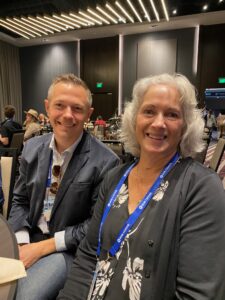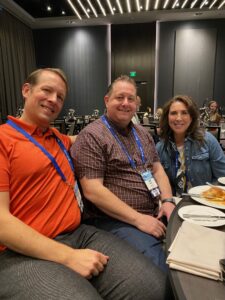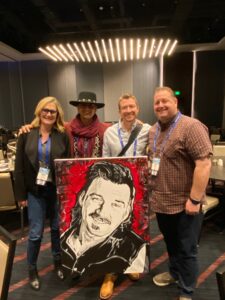
Michael Marion, CVE, Simmons Bank Arena, North Little Rock, Ark., moderates a panel on Tertiary (AKA Secondary) Markets at IEBA, with, continuing from left, Charlie Goldstone, FPC Live; Nicole Klein, BJCC; Brian Sipe, Rupp Arena, Lexington, Ky.; and Jackie Morse, ASM Grand Rapids.
IAVM members were in abundance on panels and in the room, as networking commenced at IEBA 2023 (International Entertainment Buyers Assn.) in Nashville Oct. 8-10.
Michael Marion, CVE, Simmons Bank Arena, North Little Rock, Ark., chaired a panel called “How the Touring Industry is Rethinking Tertiary Markets,” and the consensus was upbeat. Brian Sipe, Rupp Arena, Lexington, Ky., said country and urban has been “super strong” in his market. His is a Ticketmaster building, and they do dynamic pricing and platinum tickets for every show. It’s working. “Who would have thought aisle seats would go for more money.”
Scalpers are complaining about platinum, which is a good thing to Marion. “It keeps people coming to our sites and that money goes to the artist.”
“It’s not the closest seat for the highest price anymore,” said Charlie Goldstone, FPC Live. From a promoter’s perspective, he applauded everything venue managers can do to make life on the road easier and admitted that the “rules that created (radius) protection don’t apply now. Fans are genre agnostic now.”

Nick Zazal, CVP, Walmart AMP, Fayetteville, AR, talks with Gerry Van Harpen, co-owner, Hodag Country Festival, Rhinelander, WI, at the International Entertainment Buyers Assn. meet in Nashville.
“It’s more important what’s going on in your local market,” Marion added, saying it’s local sports and festivals and other alternative events in the immediate market, which promoters need “protection” from.
Let them know what’s happening, Marion said. With every interjection, he also emphasized North Little Rock is a secondary market, not tertiary, as were all the others.
Birmingham has no radius clauses from Nashville or Atlanta, but offers on-sale protection “when we can,” said Nicole Klein, Birmingham-Jefferson Convention Complex, Birmingham, Ala. “The reality is a national on-sale is a national on-sale,” and not under the control of the venue manager. When the topic comes up, she tells promoters, “We’ll do the best we can.”
Jackie Morse, ASM Grand Rapids, Mich., has also seen an increase in events and concurred that to keep them coming, it’s important to go the extra mile while still delivering the basics – which panelists defined as the internet works, the stagehands are there on time, and the coffee and shower water are hot — that’s what matters.

All from the Tacoma (Wash.) Venues & Events are Adam Cook, CVE, IAVM first vice chair; Jeff Brown and Lynn Carlotto.
Morse adds backstage amenities like a QR code roadies and tour pros can scan to find things to do in Grand Rapids, like get to MadCap Coffee Company for a cup of brew. If there are kids along on the tour, entertain them, she added.
“Catering is huge; we have a fantastic chef,” Morse said, adding that the chef welcomes the tour crew personally. Marion offers Dippin’ Dots backstage.
Most tours have two legs out of the gate, though they more often announce three now, Morse added. Marion found it amusing that cities spent the 90’s building bigger venues – 18,000-plus seats — and the 2000’s cutting them down to theater configurations, trying to make them smaller. Secondary markets need to be the right size.
Goldstone wants data, analytics, and demographics from buildings. When a building reaches out, do so with information the promoter needs.

About to visit the Neal Agency and celebrating a weekend Morgan Wallen date (the venue’s highest grossing ever), Tacoma (WA) Venues & Events marketers bought this painting to present to Wallen via his agent in Nashville. From left are Tacoma’s Tammi Bryant; Sergio Gutierrez, the artist; Rob Herbert, Sergio’s manager; and Tacoma’s Jeff Brown.
That includes communicating renovations. Agents have long memories, Klein said. Birmingham has added a $215-million stadium in the last two years and renovated the arena to the tune of $125 million. Not all promoters and agents know that.
Managers reported a mixed bag when it comes to Hispanic shows. Klein had never hosted a Latin show until 2023, and she got four this year. To market the shows, she found an Influencer group.
Asked for recent booking highlights, Morse cited Morgan Wallen and Zach Bryan. “We were able to get them for many reasons – overall marketing performance, longterm relationships.”
Lizzo was a huge booking for Sipe. Her people asked them to get the university to buy 1,000 tickets for pre-sale. They stepped up for 1,200. The University of Kentucky had never done that before.
In Birmingham, it was Feld’s Supercross which moved to the new stadium. “Supercross marketing is massive,” Klein said.
Marion chose Harry Styles in 2021. “It was relationships and money.”
